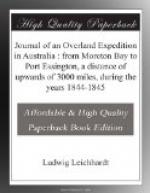Oct. 1.—The camp was moved forward to the river we had found on the 29th, about thirteen miles north by west from our camp at Sterculia Creek. About a mile from the river, we passed a large swampy lagoon, round which the natives had burned the grass. Several flocks of whistling ducks (Leptotarsis Eytoni, Gould) and many black Ibises were here. We heard the call of the “Glucking bird” every night during the last fortnight, particularly from about 2 to 5 o’clock a.m. I called this river the “Red Kangaroo River;” for, in approaching it, we first saw the Red Forester of Port Essington (Osphanter antilopinus, Gould). The longitude, according to my reckoning, was 136 degrees.
Oct. 2.—We travelled about eleven miles north by west, to lat. 15 degrees 25 minutes 18 seconds, over an undulating country, if possible even worse than that of the last two stages. Low sandy rises were covered with stringy-bark trees and saplings, and the depressions were either thickly beset with different species of Acacia, of Pultanaea, of the broad-stemmed Bossiaea, or formed shallow basins of red ironstone covered and surrounded with tea-tree scrub. On the higher elevations, the Cypress-pine thickets proved even worse than the scrub. We crossed only one sandy little creek, and came, at the end of the stage, to the head of a small Pandanus creek, which improved rapidly, and, a little way down, contained fine Nymphaea ponds. Charley went still farther down, and, in an old camp of the natives, found Cythereas and the head of a crocodile.
It was during this stage, and among the scrub and underwood of the sandy hills, that we first met with Grevillea pungens (R. Br.), a shrub from two to five feet high, with pale-green pinnatifid pungent leaves, and racemes of red flowers. Flagellaria indica, L. was very abundant near the creek; and our bullocks fed heartily upon it: particularly in this most wretched country, where the grass was scanty and hard.
Although the days were exceedingly hot, the air immediately before and after sunrise was most agreeable.
Oct. 3.—We travelled about six miles and a half north by west, over a country equally scrubby as that of the preceding stage. The saplings had been killed by a bush fire, and a hurricane, which must have swept over the country some years ago, had broken and uprooted the larger trees, which lay all to the west and north-west. Since then, saplings had sprung up, and, with the remains of the old trees, formed a most impervious scrubby thicket, through which we could move but very slowly. About a mile from our camp, we crossed a salt-water creek nine or ten yards broad. There was some vine brush, with plenty of Flagellarias, growing along its banks. A little farther, we crossed a freshwater creek, which was larger than the preceding. Both appeared to come from some conspicuous ranges, about six or eight miles to the westward. About five miles farther, we encamped on a sandy creek with fine pools of water.




